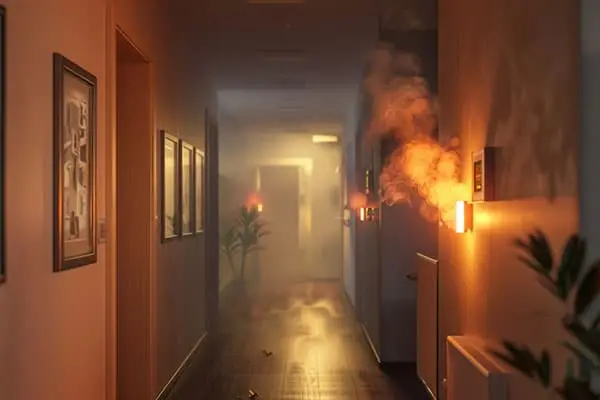Preventing electrical fires safes lives. Electrical fires pose a serious threat to homes and businesses, often leading to devastating consequences. According to the National Fire Protection Association (NFPA), electrical fires are one of the leading causes of property damage in the United States. However, many of these incidents can be prevented with proper maintenance and awareness of key warning signs. In this article, we’ll explore essential tips to help you prevent electrical fires and ensure the safety of your property.
Understanding the Causes of Electrical Fires
Before diving into prevention tips, it’s crucial to understand what causes electrical fires. Common causes include:
- Faulty Wiring: Outdated or damaged wiring is one of the most common culprits behind electrical fires. Over time, wires can become frayed, exposed, or corroded, increasing the risk of a fire.
- Overloaded Circuits: Plugging too many devices into a single outlet or circuit can overload it, causing overheating and potentially sparking a fire.
- Defective Electrical Appliances: Old or malfunctioning appliances can generate excessive heat or produce sparks, leading to fires.
- Improper Use of Extension Cords: Using extension cords as a permanent solution or overloading them can cause overheating and increase the risk of a fire.
- Space Heaters: Portable heaters are a common cause of electrical fires, especially when placed too close to flammable materials like curtains or furniture.
Key Warning Signs of Electrical Problems
Identifying early warning signs of electrical issues can significantly reduce the risk of a fire. Here are some indicators that should prompt immediate action:
- Flickering or Dimming Lights: If your lights frequently flicker or dim when you turn on appliances, it could be a sign of an overloaded circuit or faulty wiring.
- Burning Smell: A persistent burning smell with no visible source is a red flag for an electrical issue. It could indicate overheating wires or components, which could lead to a fire.
- Warm or Discolored Outlets: If an outlet is warm to the touch or shows signs of discoloration, it may be overheating. This is often caused by faulty wiring or an overloaded circuit.
- Frequent Tripping of Circuit Breakers: Circuit breakers are designed to trip and shut off the power when there’s an overload. If this happens often, it’s a sign that your electrical system is struggling to handle the load, which could lead to a fire.
- Buzzing Sounds: A buzzing or crackling sound coming from outlets, switches, or appliances indicates an electrical issue that needs immediate attention.
Maintenance Tips to Prevent Electrical Fires
Regular maintenance is key to preventing electrical fires. Here are some essential tips to keep your electrical system in safe working order:
- Schedule Regular Inspections: Hire a licensed electrician to inspect your electrical system regularly, especially if you live in an older home. They can identify and address potential issues before they become serious hazards.
- Replace Old Wiring: If your home has outdated wiring, consider upgrading it to meet current safety standards. Aluminum wiring, for example, is more prone to overheating and should be replaced with copper wiring.
- Avoid Overloading Circuits: Be mindful of how many devices you plug into a single outlet or circuit. Spread out your electrical load to avoid overheating.
- Use Surge Protectors: Invest in high-quality surge protectors to protect your devices and prevent overloads. These can also help safeguard your appliances against power surges that can cause fires.
- Maintain Electrical Appliances: Regularly inspect your appliances for signs of wear and tear. Replace any frayed cords, and never use appliances with exposed wiring.
- Proper Use of Extension Cords: Extension cords should be used temporarily, not as a permanent solution. If you find yourself relying on them often, consider having additional outlets installed.
- Keep Flammable Materials Away from Heat Sources: Ensure that space heaters and other heat-generating appliances are kept at a safe distance from flammable materials like curtains, bedding, and furniture.
- Install Smoke Alarms: Smoke alarms are your first line of defense against electrical fires. Install them in every room, and test them monthly to ensure they’re working properly.
Conclusion
Preventing electrical fires is a matter of vigilance and proactive maintenance. By recognizing warning signs and following these essential tips, you can significantly reduce the risk of an electrical fire in your home or business. Remember, when in doubt, always consult a licensed electrician to address any concerns and ensure your electrical system is safe and up to code. Prioritizing electrical safety not only protects your property but also provides peace of mind for you and your loved ones.

